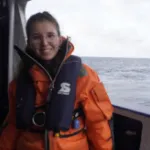The ROCCA project is led by Dr Pete Brown (NOC). Using our expertise in measuring and examining carbon uptake, transport and storage, and anthropogenic carbon accumulation in the NA oceanic region, we will extend the Canth transport analysis performed in this area, generate a complementary time series, determine and evaluate the evolving Canth column accumulation and better constrain the contribution of air-sea Canth fluxes in order to determine the drivers of anthropogenic carbon accumulation in the NA. In close collaboration with the modeling team, sensitivity responses to circulation variations and trends will be tested to determine how the drivers will change into the future with AMOC change.
Oceanographic sampling (sensor and mooring equipment)
ROCCA




